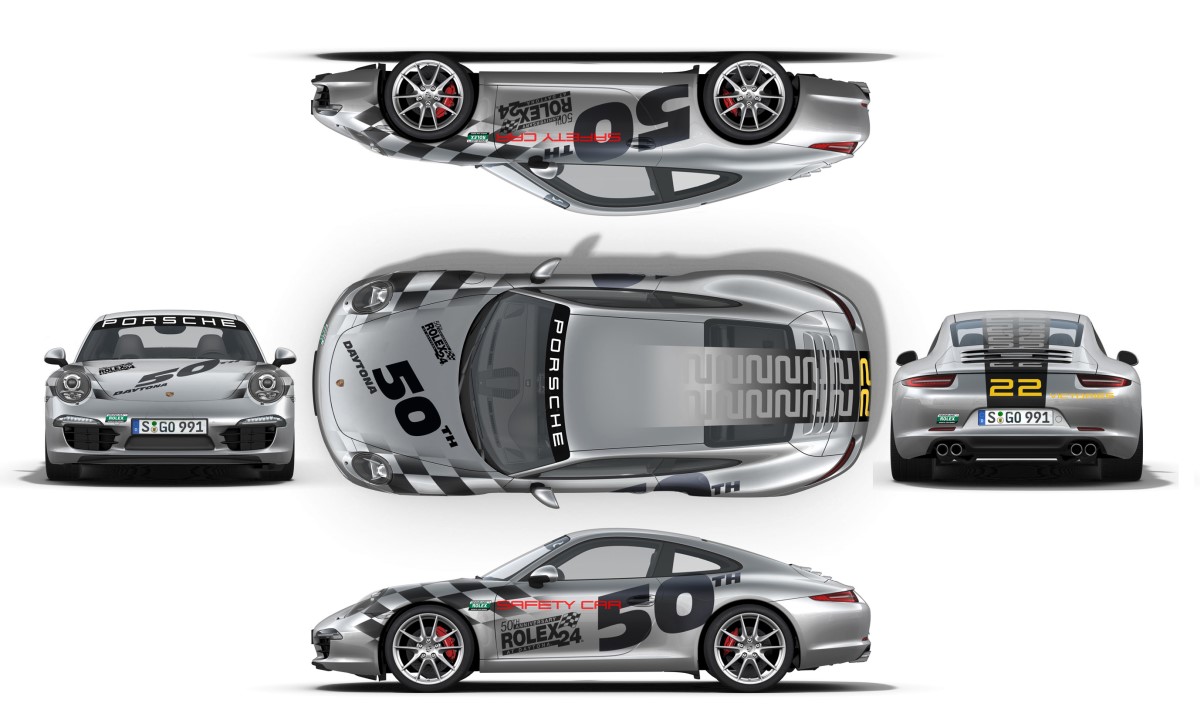7th-Generation Porsche 911 to Kick Off 50th Rolex 24
 |
| Porsche 911 |
When the Daytona Continental went to a 24-hour event in 1966, the Porsche 911 race car was already part of the field, winnings its class that year in GT 2000 with Jack Ryan, Bill Benecker and Linley Coleman at the helm. So it seems fitting that the latest Porsche 911 road car will lead the field once again in 2012 as the pace car for the 50th anniversary of this iconic sports car classic.
“Porsche has enjoyed a long and successful history in the Rolex 24 At Daytona," GRAND-AM President Tom Bledsoe said. “Having a Porsche 911 road car pacing this milestone race will be another proud addition to that heritage."
“The car will lead the field to the green flag at the beginning of the race, and perform all the pace car duties during yellow flags and restarts – a hefty assignment for a 24-hour event at which both weather and track conditions can be unpredictable," Bledsoe said.
By the late 1950s it was obvious to Porsche that the 356, which was the company’s sole product line since 1948, needed to be updated. Replacing it was necessary, yet perilous. Who knew that the eventual replacement for the 356, the 911, would surpass its predecessor in sales, longevity and glory? Or that it would be so fanatically cherished by its owners that Porsche hasn't been allowed to replace it. Or that the Company would be introducing its latest iteration all the way in 2012?
And, with Porsche Motorsport concentrating on its development of prototypes for Le Mans and elsewhere, there wasn’t much initial effort by the factory for racing the 911, but it became the most successful race car in history, and certainly the most successful race car in the history of the Rolex 24, with 39 overall and class wins – most recently the TRG GT victory in 2011 with the Porsche 911 GT3 Cup.
“As the 911 race car and street car histories are completely intertwined, it is fitting that our latest 911 road car pace the Rolex 24," said Detlev von Platen, president of Porsche Cars North America.
“Everyone will see that this newborn is truly a member of the family," said von Platen.
From every angle the latest offering is unmistakably a 911, holding true to the Porsche 911 Carrera evolution, not revolution’ design philosophy. The new car has a longer wheel base, but is both lower and lighter than its predecessor. With its two engine sizes, the new 911 Carrera is able to provide improved performance and handling, and even better fuel economy than before. The 911 Carrera is equipped with a 3.4-liter, 350hp six-cylinder boxer engine, while the Carrera S is fitted with a 3.8-liter, 400hp six-cylinder boxer powerplant, both with the optional PDK transmission available.
The first new 911 models will arrive in U.S. dealerships beginning in February of 2012.
The Porsche 911 race car started to make noise in the U.S. when IMSA’s Camel GT series started in 1970, with Brumos Racing and Hurley Haywood taking their 1970 Porsche 911S to its first championship in the 1972 season. Haywood and co-driver and Brumos co-owner Peter Gregg went on to win IMSA championships in 1973, 1974, and 1975, winning the Rolex 24 in both ’73 and ’75 while taking a class victory in ‘72.
After the Porsche 911 Carrera RS and RSR models won IMSA and Trans-Am championships in the mid-70s, the company introduced the radical Porsche 934 and 935 race cars – 911 silhouette bodied cars with big, twin-turbocharged engines that become the cars to beat in the late ‘70s and early ‘80s.
The 1980s and early 90s were prime time for Porsche Motorsport’s 956 and 962 prototype race cars, and the 911 took a bit of a back seat on the GT side to Porsche 924 and 944-based models.
Then, in 1997, Porsche introduced the GT class 911 GT2R at Le Mans where this 996-based water-cooled coupe promptly won its class, followed by the famous Porsche 911 GT1 which gave Porsche its last overall victory at Le Mans (1998).
The current family of 911 race cars which run at the Rolex 24, in production since 1989, is the 911 GT3 Cup, which was developed for the Porsche Supercup and Carrera Cup one-marque series which take place around the globe. Brumos Racing took the latest version of the car to GT championship in 2011. The other current 911 race car line is the current Porsche 911 GT3 RSR, driven to an overall victory in the 2003 Rolex 24 and a class victory in 2002 by TRG in its former form, the 911 GT3 RS.
